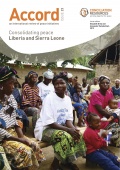Afghanistan's National Solidarity Program:
Lessons Learned on NGOs and Government Partnerships in Development
Lessons Learned on NGOs and Government Partnerships in Development
May 9, 2012
2:30 to 4:00pm
InterAction
1400 16th Street, NW, Suite 210
Washington, DC 20036
Speakers:
Clare Lockhart, Institute for State Effectiveness
Karim Merchant, former National Solidarity Program Operational Director
Topic: The
National Solidarity Program provides a model for coordinating and
aligning efforts of the Afghan government, international assistance,
international NGOs, Afghan civil society organizations and local Afghan
communities in governance and development. In light of the upcoming
Tokyo Conference on International Assistance in Afghanistan in July, as
well as broader discussions about Aid Effectiveness in Washington and
through the Busan Process, this discussion will examine lessons learned
about how to coordinate diverse stakeholders to support both governance
and development.
RSVP: Lisa Schirch, 3P Human Security at schirchl@emu.edu
Co-sponsored by the Institute for State Effectiveness, 3P Human Security and InterAction



